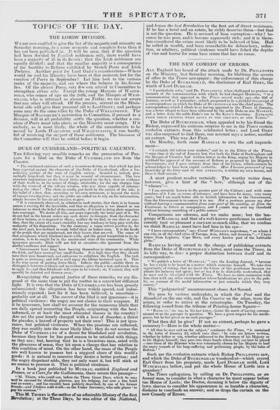DUKE OF CUMBERLAND—POLITICAL CALUMNY.
THE following very sensible remarks on the prosecution of PHI- LIPS for a libel on the Duke of CUMBERLAND are from the Courier.
" The continued existence of such a monstrous fiction as that which has just been repeated against the character of the Duke of Cumberland, offers a 'hu- miliating picture of the state of English. society. Scandal is, indeed, pro- verbially long-lived, but then it most be scandal of circumstance. The two atrocious imputations on the Royal Duke proceed on the fact, that no evidence of their truth is, in the nature of things, attainable; for the one charges him with the removal of the solitary witness, who was alone capable of substan- tiating the other ! The claim to credit, put forth by the author of the tale, is his belief of a fact, that, according to his own statement, is beyond the reach of human investigation; and the public are called on to rely on his information, simply because he has no information to give.
"It is commonly observed, in relation to such stories, that there is in human nature a craving for the incredible, and that no allegation is too absurd or too infamous to shock the belief of the commonalty, if it tend to bring,their superiors into contempt. We doubt all this, and more especially the latter part of it. We do not find in the lowest orders any such desire to derogate, from the character of their betters, as is imputed to them ; neither do we end, in one class or ano- ther, that the extent of a man's credulity has any tendency to keep pace with the malignity of his disposition. On the contrary, a rogue ceteris paribus is, for the most part, less inclined to ready belief than an honest man. It is the heads of the people that are uninformed, not their hearts that are evil. The cause of that acceptance which fidsehood meets with, and the grand temptation to its in- vention, is to be sought for in the uneducated state of the community. While ignorance prevails, libels will not fail to circulate—the ignorant form the Libeller's audience and support. " Government have Iong been busying themselves in attempts to enlighten the Irish, and have received but small thanks. It is high time that they should turn their eyes homeward, and endeavour to enlighten the English. The task is quite as necessary, and will as well repay the labour bestowed upon it. This is the true secret of putting down libels. Inform the public—enable them to distinguish between evidence and no evidence—give them a test, and teach them to apply it—and then falsehoods will cease to be coined; or, if coined, they will speedily be detected and thrown away."
Recognizing the general justice of these remarks, we are dis- posed at the same time to put the matter in a somewhat different light. It is true that the Duke of CUMBERLAND has been grossly calumniated: the allegation has been widely spread, and indus- triously repeated : how far it has been believed, is uncertain— probably not at all. The source of the libel is not ignorance—it is political virulence : the angry are not choice in their weapons. If it be ignorance, how shall we account for the numerous libels that are daily spread respecting the People, originating with the best- informed, or at least the most educated classes in the country? Are not the poor hourly charged with a love of disorder, a thirst for plunder, a hatred of property not their own? This is not igno- rance, but political virulence. When the passions are inflamed, they run readily into the most likely libel: they do not accuse the Duke of CUMBERLAND of a desire for bloodshed and revolution, because they know he has good reason to be satisfied with things as they are; but, hearing that he is a luxurious man, sated with the pleasures of sense, they hit upon a charge that has relation to this condition of mind. On the other hand, the mass of the People are well known to possess but a niggard share of this world's goods : it is natural to conceive they desire a better portion; and the angry disputant adds, they not only want it; but will stick at rio means to procure it. This is political virulence. In a book just published by MURRAY, entitled England and Prance, or a Cure for the Gallomania, there occurs this passage— "M. niers who could not, before the Three Great Days, which he may well be excused for thinking glorious, pay his lodging, has now a fine hotel and an estate; and has recently been publicly described, by one of his former friends—and 'believe with truth,--as the Under Secretary, who sells places to pay his mistress.' " This M. TRIERS is the author of an admirable History of the first Revolution; at the Three Days, he was editor of -the National, and began the last Revolution by the first act of direct resistance. If he has a hotel and an estate, he richly deserves them—,but that is not the question. He is accused of base corruption—why? be- cause he was poor, and is become apparently rich; and it is there- fore considered the crime most likely to be believed of him. Had he rolled in wealth, and been remarkable for debauchery, seduc- tion, or adultery, political virulence would have fished the depths of vice and horror for some base crime that has no name.






















 Previous page
Previous page